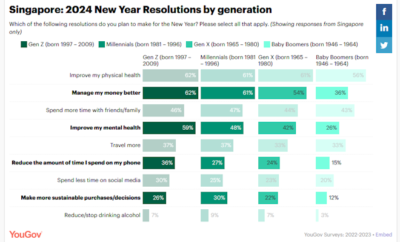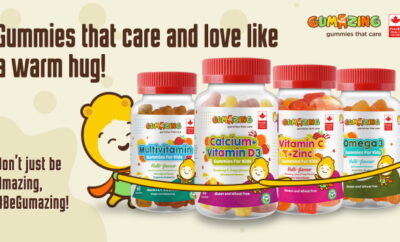
Health x Wellness
The Dangers of Health Supplements
We live in a society fixated on achieving results fast. Get fit fast. Lose weight fast. Gain muscle fast. Become healthier fast. This has resulted in the boom of the health supplement industry; and also the rise of ‘Pill Popping’ as a culture. Many of us look at vitamins, supplements, energy drinks as an easier way to get to our desired lifestyle health outcomes – shed weight, achieve mental calm, stress relief – quicker.
A study by market research firm Euromonitor said that Singaporeans are spending more on vitamins and health supplements, to the tune of SGD 40M more in 2018.
However, frequent and excessive pill popping can lead to a host of gastrointestinal ailments . It’s important to understand, and decide whether you need so many health supplements, and what are the consequences – intended or otherwise – that you could be building for yourself.
Dr Teo Cheng Rong, General Practitioner, Healthway Medical (Limbang) discusses about the effectiveness and ill-effects of health supplements as well as how to understand and verify claims on packaging.
the Active Age (AA): How effective are health supplements and vitamins?
Dr Teo Cheng Rong (TCR): Health supplements are products containing natural ingredients to supplement a diet, with benefits beyond those of normal nutrients to support or maintain the healthy functions of the human body.
They are neither meant to replace food nor use to treat specific diseases or symptoms as pharmaceutical drugs do. Despite the widespread use and purported benefits of health supplements, current medical evidence only lends support to only a few.
One example of a clinically proven beneficial use of vitamin supplementation is Vitamin D for the prevention and treatment of osteoporosis. Even though Vitamin D can be easily obtained from natural sunlight and diet, Singaporeans are often found to have insufficient or deficient levels as we seldom get adequate sun exposure. It is recommended that individuals between 51 and 70 years old should get 600 IU/day of Vitamin D while elderly above 70 years old should get 800 IU/day of Vitamin D to help with calcium absorption and maintenance of healthy bones. Research has also shown that Vitamin D supplementation in elderly reduces risks of falls.
Another effective use of vitamin supplementation is to provide women of child-bearing age folic acid (4-5 mg) three months prior to a planned pregnancy to reduce risks of neural tube defects in the baby.
Beyond these well-established use of health supplements, many over-the-counter supplements such as glucosamine, cranberry juice/extract, probiotics, omega-3 fish oils and Ginkgo biloba currently have conflicting data in terms of efficacy and benefits.
Before you start taking any health supplements, note that most, if not all, ingredients in health supplements can be easily obtained from a balanced diet. Only individuals under special circumstances may be vulnerable to deficiencies in certain vitamins/minerals and therefore require supplementation.
Otherwise, excess amounts of these supplements consumed by healthy individuals will only be removed by the body through the urine or faeces. What is worse is that overdosing on certain vitamins/minerals may lead to detrimental effects.
AA: What are the risks of taking too many supplements, or mixing these supplements?
TCR: The risks of taking too many supplements include:
- Overdosing on certain vitamins and ingredients: Too much of a good thing may be bad. Though water soluble vitamins such as vitamin B and C can generally be tolerated at high doses as they can be readily removed by the kidneys, increased doses of vitamin C have been shown to increase the risk of kidney stones. On the other hand, fat soluble vitamins (A, D, E and K) are generally more toxic. Excess vitamin E supplementation has been shown to increased risk of death while too much vitamin A in pregnancy is harmful for the growing foetus.
- Harmed by toxic products contained in health supplements: Health supplements are not strictly regulated by Singapore’s Health Science Authority (HSA) though there are regulatory guidelines for manufacturers to comply with. There have been occurrences of supplements containing active pharmaceuticals or heavy metal contamination in these products. Prolonged or excessive use of these supplements may lead to unwanted side effects.
- Drug- Supplement interaction(s): Patients who are on long-term medications such as cholesterol lowering medications, blood thinners such as aspirin or warfarin, and psychiatric medications should inform their physicians of all the health supplements they are taking. Certain health supplements such as St John’s wort, taken for sleep or mood disturbances, may interact with the medications prescribed by healthcare professionals. Mixing different supplements may also lead to unintended adverse effects from the interaction among the various health supplements and between medications.
AA: Is it possible to overdose on health supplements
TCR: Yes, it is possible to overdose.
AA: What are some common ill-effects of self-prescribed health supplements?
TCR: Notwithstanding the toxic effects of overdose and potential contamination of health supplements, studies have found some herbal extracts to have potential harmful effects. Ephedra alkaloids are chemicals extracted from Ephedra (a herb commonly known as Ma Huang). They have been used in supplements marketed for weight loss and improving sports performance. However, it was found out that these alkaloids, in combination with caffeine, can cause high blood pressure, abnormal heart rhythms and even heart attacks, strokes and seizures. This is possibly due to the stimulating effects of these alkaloids on the human body.
Another supposedly natural-occurring herbal extract that may be hidden in slimming products is Aristolochic acid found in birthwort plants. When taken as a weight loss supplement, individuals can develop serious kidney injuries and increase their chances of developing bladder and liver cancers. Therefore, consumers must be vigilant about the content of the health supplements they are taking and avoid products that come from dubious sources.
AA: How do we understand the health claims often stated on the supplement packaging?
TCR: First of all, read up on the product insert and find out what are the active ingredients contained in the supplement.
Next, find out the dose of these active ingredients (i.e. the dose of the vitamins on the packaging) and check against the recommended daily allowances (which can be found on the HealthHub website) to see if the amount of these products exceed way beyond or fall too low below the recommended allowances.
Finally, try to understand the physiological benefits of these supplements and see if there is a correlation with the health claims stated on the packaging. For example, one should have doubts about a vitamin product claiming to have benefits on joint pain.
Feel free to approach your family doctor if you still are unsure about the health claims of the supplements before purchasing them.
AA: What are some simple ways to verify these health claims?
TCR: As health supplements are not regulated by Singapore’s Health Science Authority, many sellers and distributors often over-promise or exaggerate the health claims of their supplements. If a product claims to be “approved” by the HSA, consumers should have serious reservations about the integrity of the product. Other commonly used claims that consumers should be wary of are:
- “Miracle cure” or “quick fix” claims: Products that claim to have fast onset effects may be mixed with pharmaceutical medications such as steroids or anti-inflammatory drugs to give a “quick” pain relief and make the person feel “better”. However prolonged use of these products can lead to steroid toxicity or liver and kidney damage.
- Scientific claims that are vague / hard to verify: Few supplements in the market are backed by strong scientific evidence. Sometimes, sellers make use of small studies or even anecdotal evidence to convince others to try their products. Always scrutinise the details of the so-called research papers or clarify the purported benefits of the health supplements with a healthcare professional.
- Products that claim to be an alternative to prescription medication: Health supplements should never be an alternative to actual medication prescribed by a doctor. Products that claim to have fast onset effects may be mixed with pharmaceutical medications such as steroids or anti-inflammatory drugs to give a “quick” pain relief and make the person feel “better”. However prolonged use of these products can lead to steroid toxicity or liver and kidney damage.
- Products that are “100% safe” and have no side effects: There are no products, even those with all natural ingredients, that can make such an assurance. As mentioned, excessive consumption of health supplements can have detrimental effects. Do not believe in exaggerated claims that a product can be free from side effects. If you are really unsure about a product, check the claims against the HSA guidelines or seek advice from a medical professional.
AA: What are some of the scenarios where vitamin/supplement-taking is encouraged?
TCR: Besides the above-mentioned recommended uses of vitamin D supplementation in elderly and folic acid supplementation in ladies trying to conceive, individuals with unique medical conditions or special diets may be recommended or prescribed health supplements to increase their daily intake of certain nutrients.
One common example is the use of vitamin B12 supplementation in people who follow a vegan diet – especially if they do not consume other fortified food products (such as cereals).
Multivitamin supplementation should also be considered for people at risk of vitamin deficiency, such as alcoholics, individuals with a poor-quality diet lacking in fruit and vegetables, or kidney failure patients on dialysis.
However, they are advised to do so at the discretion of their doctor. This is to ensure their treatment plan or health would not be adversely affected by the supplements, and that they only take supplements they truly need.
Otherwise, the average person can obtain their nutrition naturally through a healthy diet and active lifestyle.
AA: Nutrition/diet vs. supplements – what is your opinion?
TCR: Just remember, too much of a good thing is not necessarily better.
While supplements can complement some of the nutritional deficiencies in our diet, overloading of vitamins or herbal products can cause more harm than good. We should strive to obtain all the necessary nutrition through our diet, as whole fruits and vegetables can provide additional fibre and micronutrients while spending too much money on health supplements can burn a hole in your pocket.
Health supplementation may be useful in certain individuals such as the elderly, pregnant women or malnourished individuals who do not follow a healthy diet.
I personally but occasionally consume a moderate dose of multivitamins during stressful periods or when I am under the weather to get an extra boost. As long as you are certain of the integrity of the products you are taking, appropriate doses and the consequences of overdosing, taking health supplements should not be a major issue. However, if you are unsure whether or not you need supplements, it is always best to first consult your doctor.









